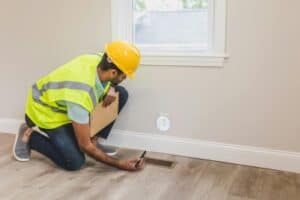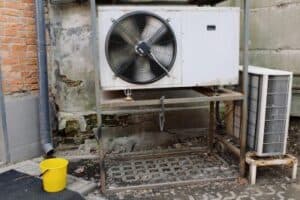Your Comfort, Our Priority
With expert technicians and a commitment to quality, Wolf delivers reliable heating and cooling solutions for every season. Experience the difference of service you can trust.
(918) 633-9077Your HVAC system plays a crucial role in keeping your home comfortable year-round, whether it’s sweltering hot outside or freezing cold. However, like any major appliance, an HVAC system requires regular maintenance to perform optimally and last as long as possible. Without proper care, an HVAC system can start to degrade, leading to inefficiency, higher energy bills, and even the need for costly repairs or replacements.
In this guide, we will walk you through how to extend the life of your HVAC system with proper maintenance, providing you with powerful tips and 7 key steps to keep your system running smoothly.
HVAC stands for Heating, Ventilation, and Air Conditioning. An HVAC system is designed to control the temperature, humidity, and air quality within a building. It works by distributing heated or cooled air through ducts and vents to maintain a comfortable indoor environment.
An HVAC system is made up of several key components, including:
Knowing the basic components of your HVAC system can help you better understand the importance of regular maintenance.

Regular maintenance can significantly improve the efficiency and lifespan of your HVAC system. Some benefits include:
In the long run, investing in regular maintenance can save you money. By keeping your HVAC system clean and well-maintained, you reduce the chances of breakdowns and the need for expensive repairs. Additionally, a properly functioning system uses less energy, reducing your monthly energy bills.
Routine maintenance also extends the lifespan of your HVAC unit, delaying the need for a costly replacement. A well-maintained system provides consistent heating and cooling, ensuring a comfortable indoor environment year-round.
Neglecting maintenance can lead to clogged filters and worn-out components, which strain the system and decrease efficiency. Scheduling professional inspections at least twice a year helps identify potential issues before they turn into major problems.
Air filters are essential for trapping dirt, dust, and allergens. Over time, filters can become clogged, restricting airflow and reducing efficiency. It’s recommended to replace or clean your filters every 1-3 months, depending on usage.
The evaporator and condenser coils in your HVAC system can accumulate dirt over time. Dirty coils can cause the system to overheat and decrease efficiency. Regular cleaning of these coils helps maintain optimal airflow and system performance.
Refrigerant is vital for your air conditioner to cool the air. If the refrigerant is low, it can cause the system to freeze up and not perform efficiently. Regular checks of the refrigerant level can help prevent this.
Proper insulation helps your HVAC system maintain the desired temperature by reducing heat loss. Make sure your insulation is in good condition, especially around ducts, windows, and doors.
Clogged ducts and vents can significantly reduce the efficiency of your HVAC system. Regular cleaning ensures that air is flowing freely and that no obstructions are present.
The condensate drain removes excess moisture from the system. If it becomes clogged, it can lead to water damage or system malfunctions. Check and clear the condensate drain regularly.
While DIY maintenance is essential, it’s also important to have a professional technician inspect your system annually. They can catch potential issues that might be overlooked and ensure that everything is working properly.

If your HVAC system begins making strange noises like banging, clanking, or squealing, it could be a sign that something is wrong. These noises could indicate loose parts, a clogged filter, or a malfunctioning component.
Ignoring these sounds can lead to more severe damage, potentially resulting in costly repairs or system failure. If you hear persistent or worsening noises, it’s best to contact an HVAC professional for an inspection.
Foul or musty smells coming from your HVAC system could indicate mold, dirt buildup, or even a gas leak. It’s essential to address these odors promptly to avoid further issues. A burning smell may signal electrical problems or overheating components, which should be inspected immediately. Regularly changing filters and scheduling routine maintenance can help prevent unpleasant odors and keep your system running efficiently.
When choosing an HVAC professional, always ensure they are licensed and certified. This guarantees that they have the necessary skills and knowledge to perform the required maintenance or repairs safely and effectively. Additionally, checking reviews and asking for references can help ensure you hire a reputable and experienced technician.
Before hiring an HVAC technician, ask for referrals from friends or family and read online reviews to ensure that the professional has a good reputation and provides quality service. You should also verify their experience with your specific HVAC system to ensure they have the expertise needed for the job.

1. How often should I service my HVAC system?
It’s recommended to have your HVAC system professionally serviced at least once a year—preferably before the start of the heating or cooling season.
2. Can I clean my HVAC system myself?
While you can handle basic maintenance tasks like changing filters, professional cleaning and inspections are needed for more complex components.
3. How long should my HVAC system last?
With proper maintenance, an HVAC system can last between 15-20 years.
4. What is the cost of HVAC maintenance?
The cost of HVAC maintenance varies depending on the service provider and the extent of the maintenance. On average, it may cost between $100 to $300 per visit.
5. How do I know if my HVAC system is working efficiently?
Signs of an inefficient HVAC system include higher energy bills, inconsistent temperature control, and unusual noises or smells.
6. What should I do if my HVAC system isn’t cooling or heating properly?
If your system isn’t functioning properly, check the thermostat, replace the air filter, and ensure the vents are open. If the issue persists, call a professional HVAC technician for inspection.
Maintaining your HVAC system is an investment in your home’s comfort and efficiency. By following the 7 key steps outlined in this guide, you can ensure that your system runs smoothly and lasts for years. Regular maintenance not only improves performance but also saves you money and extends the lifespan of your system.
With expert technicians and a commitment to quality, Wolf delivers reliable heating and cooling solutions for every season. Experience the difference of service you can trust.
(918) 633-9077
Bryan was professional and very knowledgeable. He did his best to fix my 30 yr old unit b4 making the decision to replace it. Then he charged me a yearly maintenance fee for the day since we purchased a new A/C. On top of everything, Bryan came back at 10 pm to bring window units to make sure my home would be cool. Thank you Read More

Had a new system installed, and they did an outstanding job. Arrived in the time frame that they said they would and started removing the old system. It took about 9 hours, but they moved the outside unit like I had asked with no hesitation. Ran new copper tubing, drain line, and electric. Did a very clean job on the installation, as you can see Read More

Great company with awesome employees. A friend of mine recommended Wolf’s when my ancient AC went out. Staff are always punctual, respectful and knowledgeable. No one wants to buy a new heat and air system, but this company made the process as easy and painless as possible!

Dalton Yandell was very thorough on servicing our unit. Not only did he clean around the outside of the unit, he also evaluated the condition of the inside of the unit and also clean it very thoroughly. He left an application to obtain a rewards membership to service our unit twice a year. Was very impressed with his work ethic, he was very cordial and Read More

Highly recommend Wolf’s Heating & Air Conditioning! They went above and beyond to get us on their schedule. Sam and Marcus did a fantastic job figuring out the issue, ordering the parts and making sure we were up and running! They were polite, professional and thorough!
Our experienced technicians handle the hard work so you don’t have to. Whether it’s maintenance, repairs, or installation, Wolf Heating & Air is ready to help.
(918) 633-9077